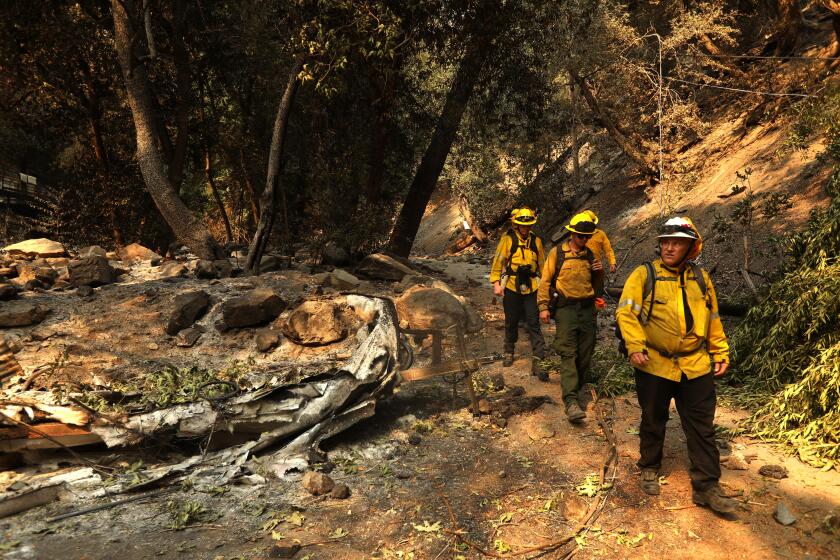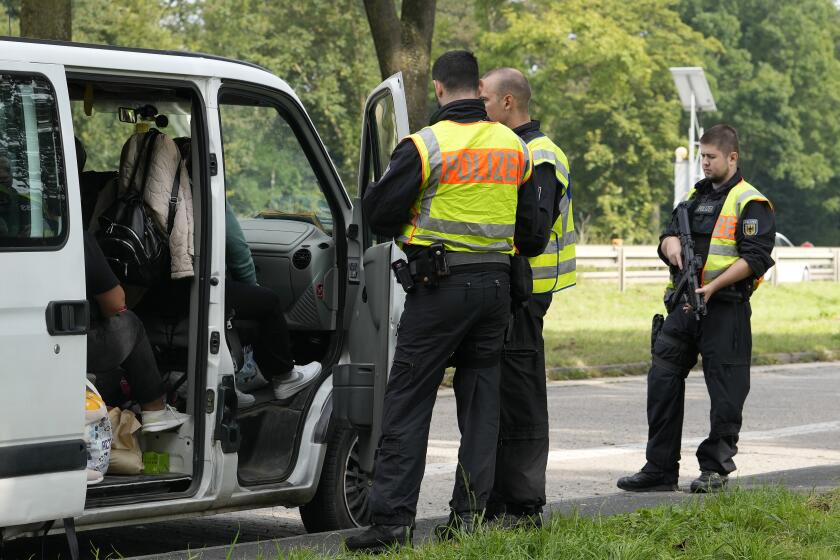If your airline goes belly up, must trip plans also succumb?
The airline you’re booked on just went out of business. Now what?
Thousands of National Airlines passengers faced that dilemma this month when the Las Vegas-based discounter ceased operations. It joined two other U.S. airlines that quit flying this year, Vanguard and Midway, both in July.
Here are two tales from the chaos that ensued:
The night of Nov. 6, Mariko Gallaga of Chicago called her sister-in-law in Las Vegas to ask what to pack for a family reunion there. Gallaga was flying to Vegas the next morning on National, as were her husband, son and brother. As the two women talked, the news broke on TV: National had stopped flying.
“It was a shock,” Gallaga says.
Her son called Southwest Airlines and was told he could use his National ticket to fly standby free or get a confirmed seat on a special low fare; he booked a $308 round trip. She tried the same and got a different Southwest agent, who, she said, told her she couldn’t fly standby and would have to pay full fare. Gallaga finally got a $615 fare on American Trans Air -- more than her $250 National ticket but less than the $1,000-plus other carriers wanted.
While Gallaga scrambled, Steve and Germaine Devery of Bremerton, Wash., were sitting in the Las Vegas airport, wondering what had happened to their 4:15 p.m. National flight to Seattle. It was about 6:30 p.m., and National had announced only that the flight was delayed. They learned the truth from a fellow passenger, who told them Alaska Airlines would honor their tickets on standby. The Deverys got out on a 9 p.m. flight. It was a memorable end to their 57th anniversary jaunt to Vegas.
Here are some options for stranded travelers:
Immediately get on another airline: Passengers whose airline has stopped operating are entitled to fly standby on another carrier if it has space available. They must travel on the same date and to the same place as originally ticketed.
These rights are in a ruling that the U.S. Department of Transportation issued in August to clarify a law passed after the travel disruptions of Sept. 11.
Details are open to interpretation. The ruling appears to allow airlines to charge processing fees up to $25 each way to carry standbys from defunct airlines. Some airlines say they won’t have to honor such standbys after May 19, when the law on which the ruling is based will expire; others put the cutoff in early January. (To see the full text, visit dms.dot.gov/general/orders/aug02/183624web.pdf.)
The DOT ruling does not require airlines to provide confirmed seats in this situation, so you’ll probably have to buy a new ticket if, like Gallaga, you want a guaranteed seat. Some examples of policies, according to airline spokesmen:
Southwest will honor National tickets on a standby basis, without a fee, until early January. For confirmed seats, it waived advance-purchase rules, allowing National customers to get the lowest available fare, through Nov. 13. Now they’ll have to buy a new ticket at the market price. (Southwest says the advice given to Mariko Gallaga was wrong.)
America West is honoring National tickets by offering only standbys, with a $25 fee per flight segment (leg), until Jan. 6. American will honor standbys only for travel through May 19, with a $25 fee, but you must notify the airline by Jan. 5.
Ask for a credit-card refund: If you fly standby on another carrier, you can’t get a refund on your National fare, say Visa, MasterCard and American Express. In their view, you got the service you paid for.
If you buy a new ticket on another carrier, policies vary. Here’s what company representatives told me:
MasterCard will generally refund your National ticket. At Visa, the policy varies by the issuing bank. At American Express, if you can’t be accommodated on another airline, “we will give credits ... consistent with our legal obligations and with our commitment to providing the high level of customer service that is associated with the American Express brand,” a spokeswoman said. She declined to be more specific.
Collect on your travel insurance: If you were booked on National, this is probably not an option. None of several big travel insurers I spoke with covered National because it had been in Chapter 11 bankruptcy protection for two years. Ditto for US Airways, also in Chapter 11.
If your airline is covered and your policy includes “financial default” or similar wording, you generally would be compensated for the cost of your ticket if the carrier goes out of business. Most insurers require you to try to deal with your credit card company first.
Better luck next time: Steve Devery liked the National fare, $144 round trip between Seattle and Las Vegas, that his daughter found on the Web. So he booked it, even though he’d never heard of National. Had he done his research, he would have known of the airline’s troubled financial history.
But companies may go broke without warning, and some, like National, defy the odds for years by continuing to operate under bankruptcy protection. So experts offer these tips:
Always pay for plane tickets by credit card. Be sure it’s a credit, not a debit or ATM card. Those don’t offer consumer-protection policies.
Consider buying travel insurance. This typically costs 4% to 8% of the trip price, depending on the type of coverage.
Save all receipts to document your claim.
As for bankruptcy court, don’t get your hopes up. Resolving a claim can take months or years. Even then, “it’s 5 cents on the dollar, if you’re lucky and the company has assets,” says Patricia Campbell, formerly president of the California Travel Consumer Restitution Corp., which administers a state fund for consumer claims.
*
Jane Engle welcomes comments and suggestions but cannot respond individually to letters and calls. Write Travel Insider, Los Angeles Times, 202 W. 1st St., Los Angeles, CA 90012, or e-mail jane.engle@latimes.com.
Sign up for The Wild
We’ll help you find the best places to hike, bike and run, as well as the perfect silent spots for meditation and yoga.
You may occasionally receive promotional content from the Los Angeles Times.



